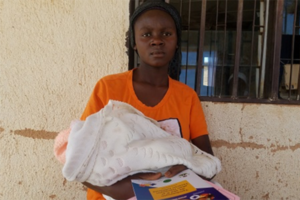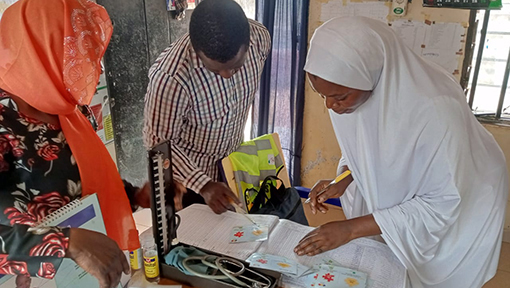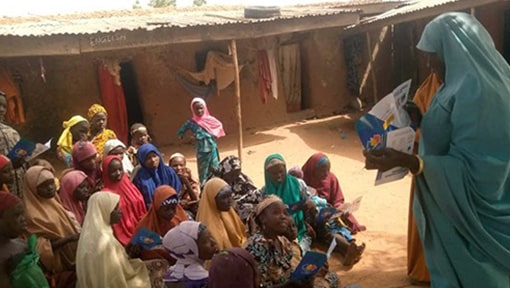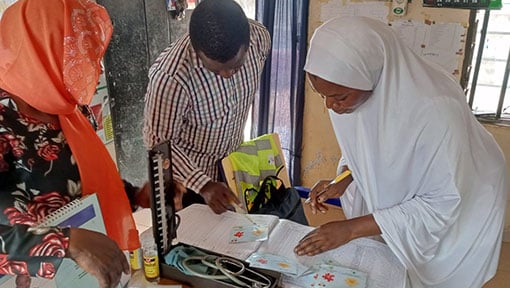In Their Words: Family Planning Access Changing Lives in Nigeria
Empowered to Access Family Planning Services

Aisha with her son.
During a social mobilization activity that The Challenge Initiative (TCI) held in the Jos North local government area in Plateau state, Aisha, a 23-year-old stay-at-home mom, listened intently as the social mobilizer explained the benefits of family planning services.
Aisha was particularly interested because she became pregnant with twins immediately after getting married at 19 and, unfortunately, lost them due to complications that almost claimed her life as well. Six months after that harrowing experience, Aisha became pregnant again and experienced complications that led to an emergency cesarean section at eight months. As a result, Aisha knew she did not want to become pregnant again without allowing enough time for her body to heal.
After hearing from the TCI social mobilizer, she knew family planning would help her plan her next pregnancy. Aisha’s mother supported her decision and broached the subject with Aisha’s husband on her behalf. Her husband, a primary school teacher, had limited knowledge of family planning and erroneously believed it was only for couples that no longer wanted children. After discussing it with Aisha’s mother, he came to understand how family planning would be benefit his wife and, therefore, his family.
Aisha then visited a TCI demonstration health facility where she accessed a long-acting, reversible contraceptive method. She shared her relief after receiving the method, saying, “I thank God for saving my life through family planning.”
Accessing family planning services not only provided Aisha with the opportunity to space her pregnancies, it also gave her the chance to avoid further pregnancy complications therefore saving her from potential infertility, disability or even death.
Contributed by: Eje Chimzaram Chukwuma
Restoring Harmony in the Household After Receiving Family Planning Services

Victoria Mbaba is a 35-year-old mother of seven children.
Victoria Mbaba is a 35-year-old mother of seven children living with her husband in Ezinifite Okpuno, Awka South local government area (LGA) in Anambra state. She is known in her community as “Nwanyi Ukwa” [bread fruit woman] – a name given to her from trade in ukwa, a southeastern delicacy. She works to support her large family and ensure her children are well cared for. Her husband occasionally serves as a motorcycle rider (“Okada”) but often is unemployed and jobless.
Victoria constantly worries about having additional children and, as a result, avoids sexual intimacy with her husband, which contributes to tension in her marriage. Although Victoria had heard about family planning, she had some concerns and didn’t know that a facility near her home offers family planning services.
In August 2019, Chioma Okafor, a satisfied family planning user and social mobilizer in Awka South LGA, reached out to “Nwanyi Ukwa” with family planning information. She informed her of the benefits of family planning, the various methods available and dispelled the myths and misconceptions that Victoria had heard. She referred Victoria to the Okpuno primary health center (PHC). Chioma also provided her with information on the affordability of contraception and proximity of the services to her home. Empowered with this information, Victoria went to the Okpuno PHC, where she was counselled and received the family planning method of her choice.
Now, she enjoys intimacy with her husband without fear of an unplanned pregnancy, making both her and her husband happy.
Contributed by: Onyedikachi Ewe
Supporting a Mother and Her Daughter to Achieve Their Dreams in Plateau State

Naomi had her baby when she was just 15 years old.
Naomi lives in the Nyango community in Jos South local government area (LGA) in Plateau State. She was 14 years old and in her third year of secondary school when she had her first sexual experience, became pregnant and was expelled from school. The boy who impregnated Naomi denied knowing her. As a result, Naomi’s mother now is responsible for taking care of both Naomi and the newborn baby.
During a TCI-supported social mobilization neighborhood campaign, Naomi’s mother learned about family planning and immediately collected a referral card for her daughter. She wants a better life for her daughter, and wants her to return to school and avoid the possibility of another unwanted pregnancy. So Naomi’s mother shared what she had learned about family planning and brought her to the facility to ensure Naomi accessed the services.
With the consent of her mother, Naomi accepted an implant – a long-acting reversible contraceptive method – in the facility after receiving counseling on all of the methods available.
“Family planning will help us achieve our dream because my daughter will go back to school next year and continue with her studies as there is a guarantee she can never repeat the same mistake with the new protection she has,” Naomi’s mother said.
Contributed by: Eje Chimzaram Chukwuma
Mother of 15 Accesses Family Planning for the First Time in Taraba State

After having 15 children, Jara (left, with eight of her children) accessed family planning services. She is seen here with Miriam Njongun, a Health Educator in Sardauna LGA.
Jara is a widow who, according to traditional practices, has to marry her brother-in-law after a mourning period for her husband. She spoke to TCI about the challenges of being a widow and her happiness at having the power to limit pregnancies in her next marriage:
“I feel relaxed and at peace now knowing that getting pregnant for the next five years is impossible and even when I get remarried, there is no fear of getting pregnant. With the current financial hardship of being a widow, it’s been very difficult for me to feed, clothe and even shelter my children. Some of them had to leave school and accompany me to the farm because I could not afford their fees. As a farmer, I depend on the rainy season to farm, then wait for the harvest. I gave out 12 of my children to relatives and friends to help nurture them as I will not be able to care for them, but I had to take back 10 of my children because their situation became worse. I had no idea that family planning could help a woman to space her pregnancies.”
Jara, who married her first husband at age 14, is excited by the change that accessing family planning has brought to her life:
“If I had known earlier the benefits of family planning, I would have adopted a method even without the consent of my husband. Though the benefits to the community may not be seen now, some benefits are long term and so I have also decided to speak to the younger women on the benefits of family planning so that they do not make the same mistakes that I made. This also gives me the assurance to work hard without worry in providing for my children.”
Contributed by: Victoria Mohammed






